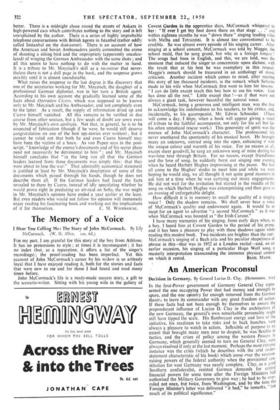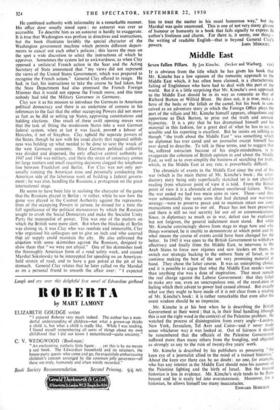An American Proconsul
Decision in Germany. By General Lucius D. Clay. (Heinemann. uis.) IN the four-Power government of Germany General Clay repre- sented the one occupying Power that had money and strength to spare, and the one etpuntry far enough removed from the German theatra to leave its commander with any great freedom of action. If these facts had not been enough by themselves to ensure the preponderant influence of Lucius D. Clay in the architecture of the new Germany, the general's own remarkable personality might still have tipped the scale. His flamboyant energy and love of the initiative, his readiness to take risks and to back hunches, were always a pleasure to watch in action. Inflexible of purpose to an extent that brought many men near to despair, he was flexible in tactics, and the crises of policy among the western Powers in Germany, which generally seemed to turn on General Clay, were always resolved if only at the last moment. Perhaps the most extreme instance was the crisis (which he describes with the arid under- statement characteristic of his book) which arose ever the revenue- raising powers of the federal authority when the provisional con- stitution for west Gertnany was nearly complete. Clay, as a good Southern confederalist, resisted German demands for central financial powers for some time after the Foreign Ministers had authorised the Military Governors to give way ; he had to be over- ruled not once, but twice, from 'Washington, and by the time the Foreign Minister's letter was delivered " it had," he remarks, " lost much of its political significance."
He combined authority with informality in a remarkable manner. His office door usually stood open ; no autocrat was ever so accessible. To describe him as an autocrat is hardly to exaggerate. It is true that Washington was profuse in directives and instructions, but the book illustrates lavishly the special character of the Washington government machine which permits different depart- ments to cancel out each other's policies ; this leaves the man on the spot a wide discretion to select the instructions of which he approves. Sometimes the system led to awkwardness, as when Clay opposed a unilateral French action in the Saar and the Acting Secretary of State announced that ." my views did not represent the views of the United States Government, which was prepared to recognise the French action." General Clay offered to resign. He had, in fact, his instructions to take the course he had taken, but the State Department had also promised the French Foreign Minister that it would not oppose the French move, and this time nobody had told the Military Governor in Germany. bay saw it as his mission to introduce the Germans to American political democracy and there is an undertone of censure in his references to the fact that the other occupying Powers did not move as fast as he did in setting up States, approving constitutions and holding elections. One result of, these swift opening moves was that the task of fitting the mushroom States into a west German federal system, when at last it was faced, proved a labour of Hercules, if not of Sisyphus. Clay upheld the separate powers of the States, though he saw with his usual clarity that regional selfish- ness was holding up what needed to be done to save the wreck of the west Germany economy. Since German political authority was divided and dispersed, the only effective central authority in 1947 and 1948 was military, and (here the strain of autocracy comes in) large matters and small requiring decisions clogged the telephone line between Frankfurt and Berlin. For Clay was not only per- sonally running the American zone and personally conducting the American side of the laborious work of building a federal govern- ment ; he was also, handling the Russians, a protagonist on the great international stage.
He seems to have been late in realising the character of the game that the Russians played in Berlin ; or rather, while he saw how the game was played in the Control Authority against the representa- tives of the occupying Powers in person, he missed for a time the full significance of the political manoeuvres by which the Russians sought to crush the Social Democrats and make the Socialist Unity Party the monopolist of power. This was one of the matters on which the British were more alert. But when the blockade of Berlin was closing in, it was Clay who was resolute and immovable, Clay who organised his colleagues not to give an inch and who asserted that air supply could maintain the city. He also enlivened the situation with some skirmishes against the Russians, designed to show them that " we were not afraid." One of his skirmishes took the thoroughly American form of a road safety week, and caused Marshal Sokolovsky to be intercepted for speeding on an American- held stretch of road, and to have a gun poked at the pit of his stomach. General Clay relates that he later called on the Marshal as on a personal friend to smooth the affair over: " I expected
him to treat the matter in his usual humorous way," but the Marshal was quite unamused. This is one of not very many gleams of humour or humanity in a book that fails signally to express its author's liveliness and charm. For there is, it seems, one thing— the writing of readable English—that is beyond General Clay's







































 Previous page
Previous page